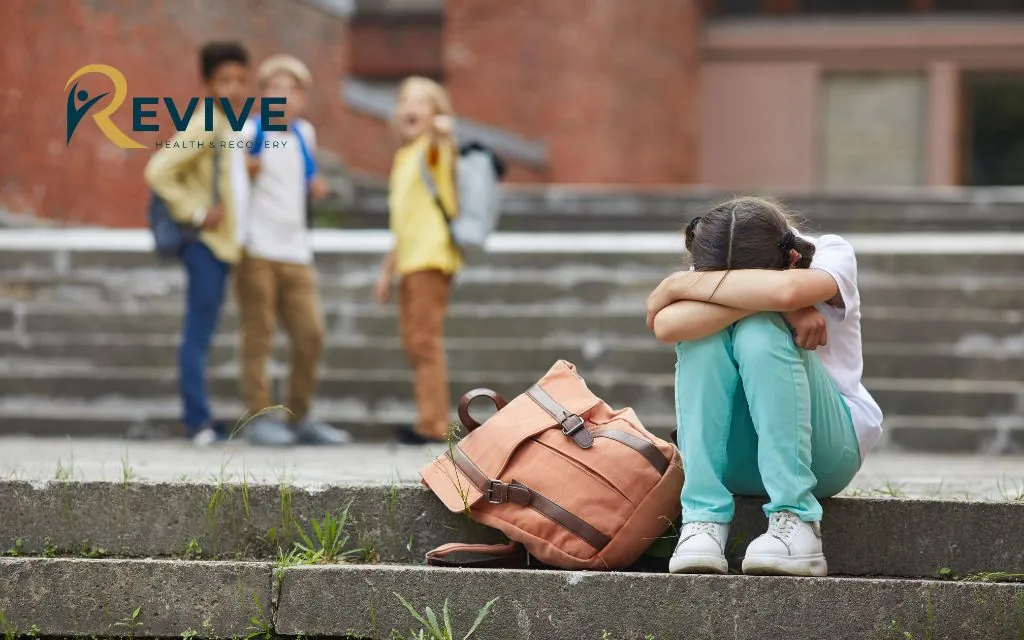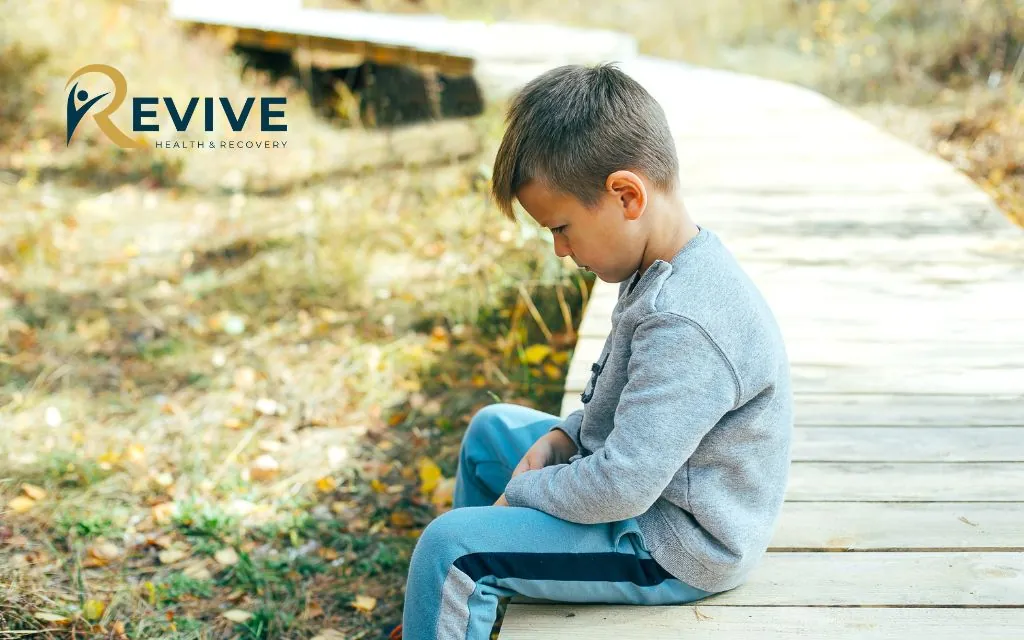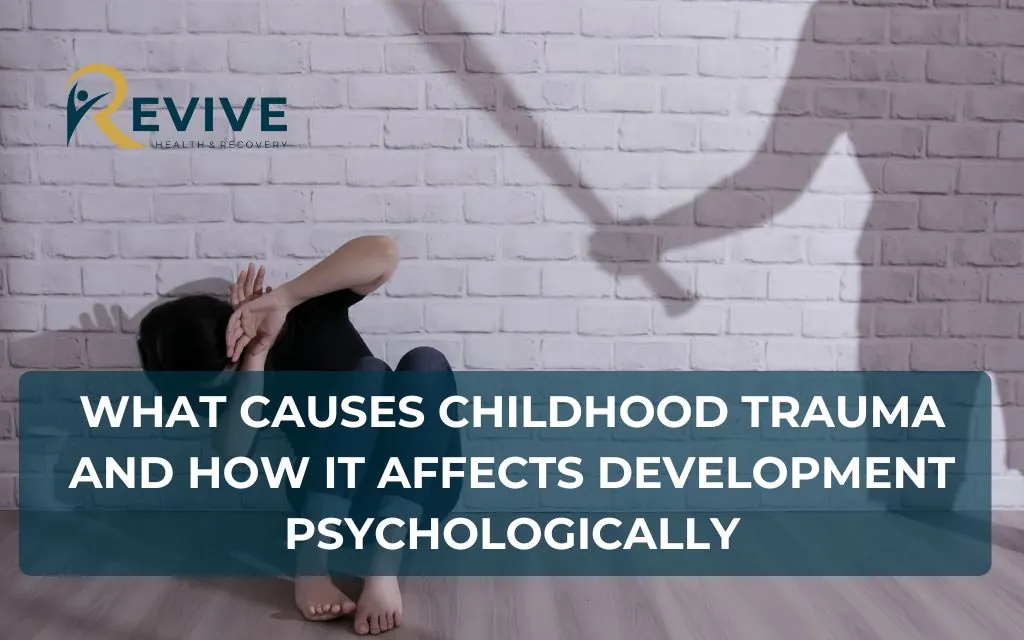Understanding what causes childhood trauma is the first step toward recovery. At Revive Health Recovery, we believe in the power of healing trauma stories– real journeys of resilience and growth that show recovery is possible. Whether trauma stems from neglect, abuse, or loss, each story of healing inspires hope and reminds us: you are not alone.
Understanding Childhood Trauma: Definitions and Importance
Childhood trauma refers to experiences that overwhelm a child’s capacity to cope, creating lasting psychological impacts. These events disrupt a child’s sense of safety, stability, and belonging, potentially altering brain development and emotional regulation systems.
The Adverse Childhood Experiences (ACEs) framework, developed through groundbreaking research, identifies specific traumatic events that impact child development. ACEs include abuse, neglect, and household dysfunction like domestic violence or substance abuse.
In Colorado, the prevalence of childhood trauma exceeds national averages. Current data indicates that 55% of Colorado children have experienced at least one adverse childhood experience, with 11% experiencing three or more ACEs. This local context underscores the importance of trauma-informed approaches for Denver families and communities.
Common Causes of Childhood Trauma in Colorado
Abuse and Neglect: Key Triggers
Child abuse remains a primary cause of childhood trauma. Physical abuse creates not only bodily harm but profound psychological wounds. Sexual abuse violates boundaries and trust in ways that can impact a child’s entire life trajectory. Emotional abuse, including constant criticism, humiliation, or rejection, damages a child’s self-concept and emotional development.
How does neglect cause childhood trauma? When children’s basic needs for food, shelter, supervision, medical care, or emotional connection go unmet, the resulting trauma can be as severe as that caused by active abuse. Physical and emotional neglect communicate to children that they don’t matter, disrupting attachment and hindering development.

Family Dysfunction and Its Impact
Family environments significantly influence childhood development. Parental divorce, while sometimes necessary, can create traumatic experiences when children witness ongoing conflict or feel responsible for the separation. Household substance abuse exposes children to unpredictable behavior, neglect, and sometimes violence.
The effects of family dysfunction on children extend beyond immediate emotional reactions. Research reveals that chronic stress from dysfunctional family environments triggers biological changes, including epigenetic modifications that can affect gene expression without altering DNA. These biological responses to trauma explain how intergenerational trauma causes can be passed from parent to child, creating cycles that affect multiple generations.
Beyond the Obvious: Less Recognized Causes of Trauma
Intergenerational Trauma and Epigenetics
Trauma can transcend generations through multiple pathways. As mentioned in “childhood trauma in adults” article, parents who experienced trauma may struggle with attachment, emotional regulation, or parenting skills, or even with how to remember childhood trauma for appropriate treatment. Recent research on epigenetic factors in childhood trauma demonstrates how stress can modify gene expression, potentially transmitting vulnerability to stress across generations.
For Denver’s diverse communities, acknowledging culturally-specific sources of intergenerational trauma proves essential for effective intervention and healing.
School Bullying and Peer Conflict
Childhood trauma from bullying deserves serious attention. The persistent harassment, exclusion, or physical aggression that constitutes bullying can create profound psychological wounds. In Denver schools, bullying affects thousands of students annually, causing anxiety, depression, and sometimes suicide risk.
Children who experience bullying often develop trauma responses similar to those seen in other forms of abuse, including hypervigilance, avoidance behaviors, and intrusive memories.
Modern Triggers of Childhood Trauma in Denver
Cyberbullying and Social Media
Digital spaces create new trauma vectors for today’s children. Trauma from social media can occur through cyberbullying, exposure to disturbing content, or unhealthy social comparison. Unlike traditional bullying, online harassment follows children home, potentially creating inescapable traumatic environments.
Denver families face particular challenges with supervision as children navigate online spaces that parents may not fully understand or monitor effectively.

Community Violence and Safety Concerns
Exposure to community violence creates significant trauma risk. Children witnessing violence in their neighborhoods may develop symptoms similar to combat veterans, including intrusive thoughts, emotional numbing, and concentration difficulties.
In certain Denver neighborhoods, community violence represents a significant childhood trauma risk factor, particularly affecting minority and economically disadvantaged youth.
Pandemic-Related Childhood Trauma
The COVID-19 pandemic generated new trauma sources for children. Pandemic-related childhood trauma stems from disrupted routines, social isolation, parental stress, economic insecurity, and direct experiences with illness or death. Denver schools and mental health systems continue addressing these impacts, which disproportionately affected vulnerable populations.
Effects of Childhood Trauma and Long-Term Impacts
Childhood trauma creates both immediate and long-term consequences. In the short term, trauma triggers may cause emotional dysregulation, nightmares, regression, or behavioral problems. Without intervention, these adverse childhood experiences often lead to long-term impacts, including:
- Increased risk of depression, anxiety, and PTSD
- Higher likelihood of substance use disorders
- Vulnerability to how childhood trauma affects health, including heart disease and autoimmune disorders
- Relationship difficulties and attachment issues
- Academic and vocational challenges
The ACEs framework demonstrates how childhood trauma accumulates, with multiple ACEs exponentially increasing health and wellness risks throughout life.

Recognizing Trauma Soon in Children: Signs and Symptoms
Early identification of trauma symptoms enables timely intervention. Watch for these potential indicators:
- Sleep disturbances or frequent nightmares
- Withdrawal from previously enjoyed activities
- Regression to earlier developmental behaviors
- Unexplained physical complaints (headaches, stomachaches)
- New fears or anxiety
- Aggressive behavior or frequent tantrums
- Difficulty concentrating or declining school performance
- Trauma-specific reenactment in play
Remember that children express trauma differently depending on developmental stage, personality, and cultural background. Some children internalize their responses while others externalize through behavior.
Seeking Help: Therapy and Resources in Denver
When to Consult a Therapist About Childhood Trauma Causes
Consider consulting a therapist about childhood trauma causes in Denver when:
- Trauma symptoms persist for more than a month
- Emotional or behavioral changes significantly impact daily functioning
- School performance declines noticeably
- The child expresses suicidal thoughts or engages in self-harm
- Your family needs support processing traumatic events
- You notice concerning patterns but aren’t sure if trauma plays a role
Early intervention significantly improves outcomes for traumatized children. Professional support can help children process experiences, develop coping strategies, and restore developmental trajectories.

Finding Local Experts and Booking Appointments
Denver offers numerous resources for families affected by childhood trauma. Revive Health Recovery provides specialized trauma-informed care designed to address the unique needs of children and families. Our experienced team understands the complex interplay of biological, psychological, and social factors in childhood trauma.
To find an expert on childhood trauma causes in Denver or book an appointment to discuss trauma origins, contact Revive Health Recovery at (303) 268-4655. Our comprehensive assessment process helps identify specific trauma causes and develop tailored treatment approaches.
Don’t wait until symptoms worsen. Reaching out demonstrates strength and commitment to your child’s wellbeing.

FAQs about what causes childhood trauma
What are the most common causes of childhood trauma?
The most common causes include physical, sexual, and emotional abuse; neglect; witnessing domestic violence; parental substance abuse; and significant loss or separation. In Denver, family dysfunction and community violence represent significant contributors
How does neglect contribute to childhood trauma?
Neglect traumatizes children by failing to meet basic physical, emotional, and developmental needs. This absence of care communicates unworthiness to children and prevents the formation of secure attachments necessary for healthy development.
Can childhood trauma be inherited?
While trauma itself isn’t genetically inherited, its effects can be transmitted across generations through epigenetic changes, parenting patterns, and family systems. Revive Health Recovery addresses these intergenerational patterns through comprehensive family treatment.
What are the signs of trauma in children?
Signs include behavioral changes, emotional dysregulation, sleep disturbances, regression, physical complaints, academic difficulties, and relationship problems. Different children express trauma in different ways based on age, temperament, and support systems.
How does social media affect childhood trauma?
Social media can cause trauma through cyberbullying, exposure to disturbing content, excessive comparison, and addiction-like behaviors that disrupt development. It can also amplify existing trauma by providing constant reminders or triggering content.
Conclusion
Childhood trauma doesn’t arise from a single source – it can stem from a wide range of experiences, including abuse, neglect, family dysfunction, community violence, or even modern stressors like social media and global crises. Understanding what causes childhood trauma is crucial for parents, caregivers, and professionals who want to support a child’s emotional and psychological well-being.
In Denver and across Colorado, countless families are navigating the long-term effects of early trauma – often without the guidance or resources they need. But healing is possible. With early intervention, trauma-informed care, and compassionate support, children and adults can break the cycle of pain and build stronger futures.
If you or someone you love is struggling with the lasting impact of childhood trauma, don’t wait. Revive Health Recovery offers expert trauma therapy and personalized care right here in Denver. Our team is ready to help you uncover the roots of trauma and take the first step toward lasting recovery.
Contact Revive Health Recovery today to schedule a confidential consultation and start your healing journey.



